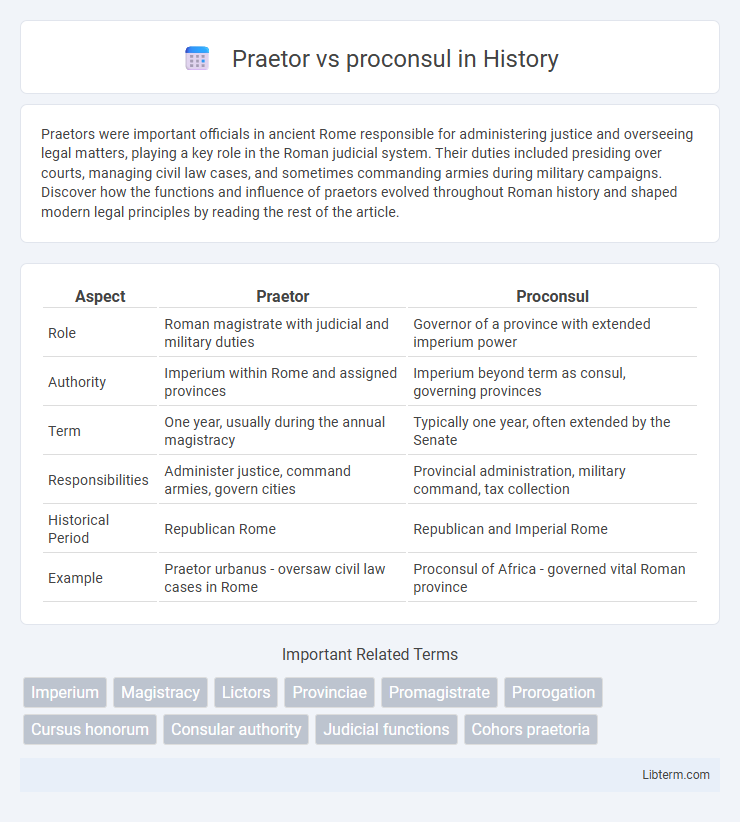Praetors were important officials in ancient Rome responsible for administering justice and overseeing legal matters, playing a key role in the Roman judicial system. Their duties included presiding over courts, managing civil law cases, and sometimes commanding armies during military campaigns. Discover how the functions and influence of praetors evolved throughout Roman history and shaped modern legal principles by reading the rest of the article.
Table of Comparison
| Aspect | Praetor | Proconsul |
|---|---|---|
| Role | Roman magistrate with judicial and military duties | Governor of a province with extended imperium power |
| Authority | Imperium within Rome and assigned provinces | Imperium beyond term as consul, governing provinces |
| Term | One year, usually during the annual magistracy | Typically one year, often extended by the Senate |
| Responsibilities | Administer justice, command armies, govern cities | Provincial administration, military command, tax collection |
| Historical Period | Republican Rome | Republican and Imperial Rome |
| Example | Praetor urbanus - oversaw civil law cases in Rome | Proconsul of Africa - governed vital Roman province |
Introduction to Roman Magistracies
Praetors were key Roman magistrates responsible for administering justice and commanding armies, ranking just below consuls in the cursus honorum. Proconsuls were former consuls granted extended military and administrative authority in the provinces, exercising imperium beyond their original term. Both played crucial roles in the Roman Republic's political and military hierarchy, with praetors often transitioning to proconsular positions to govern distant territories.
Definition of Praetor
A Praetor was a crucial magistrate in ancient Rome responsible primarily for administering justice and presiding over courts, often handling civil law cases. Unlike the Proconsul, who held provincial military command and governed territories, the Praetor's role was centered on the judicial system within the city or assigned provinces. The office of Praetor was established to manage the increasing complexity of Rome's legal system, ensuring the enforcement of laws and the protection of citizens' rights.
Definition of Proconsul
A proconsul was an ancient Roman official who governed a province with imperium, wielding greater authority and military command than a praetor, whose role was primarily judicial and administrative within the city of Rome. Unlike praetors, proconsuls acted as governors of conquered territories or provinces after their elected term in office, often holding power for one to three years. The proconsul's position was crucial for maintaining Roman law and order in distant regions while exercising significant executive and military responsibilities.
Historical Development of Both Roles
Praetors in ancient Rome initially held judicial authority and later took on military command during the Republic, evolving as magistrates who governed provinces and administered justice. Proconsuls emerged as former consuls granted extended imperium to govern provinces with greater military and administrative power, particularly during Rome's territorial expansion. Over time, the proconsul's role became more prominent in provincial governance, reflecting Rome's transition from city-state judicial functions to imperial provincial administration.
Key Duties and Responsibilities
Praetors primarily managed judicial functions, overseeing civil and criminal courts and administering legal proceedings in ancient Rome. Proconsuls held administrative and military authority, governing provinces, commanding legions, and maintaining public order. While praetors focused on legal arbitration within Rome, proconsuls exercised broader executive power in provincial territories.
Differences in Legal Authority
Praetors exercised imperium primarily within the city of Rome and its immediate surroundings, overseeing judicial functions and commanding armies during wartime, while proconsuls held extended imperium in the provinces, wielding both military and civil authority independent of direct oversight. Praetors' legal authority was generally more limited and subject to the Senate's constraints, whereas proconsuls operated with greater autonomy, administering law, collecting taxes, and leading provincial governance. The distinction reflects a hierarchy in Roman administrative law, where proconsuls managed broader territorial jurisdictions compared to the more judicially focused powers of praetors.
Geographic Scope of Power
Praetors exercised judicial and military authority primarily within a specific province or the city of Rome, with their geographic scope often limited to urban or provincial jurisdictions. Proconsuls held broader territorial command, governing entire provinces with both civil and military authority, especially in significant or frontier regions of the Roman Republic and Empire. This expanded geographic scope allowed proconsuls to exercise imperium over larger areas, often requiring long-term deployment beyond Rome.
Terms of Office and Appointment
Praetors in ancient Rome typically held office for one year, appointed by election through popular vote or by the Senate during the Republic, often serving judicial or military duties. Proconsuls were former consuls granted extended imperium, appointed by the Senate or the assembly to govern provinces, with terms that could last multiple years to ensure stable provincial administration. The appointment process distinguished the proconsul's authority beyond Rome, contrasting with the shorter, more limited term of praetors focused on domestic or military roles.
Influence on Roman Governance
Praetors held significant judicial authority and were key in administering Roman law, often governing provinces with senatorial approval, shaping the legal framework of Roman governance. Proconsuls, typically former consuls, wielded greater military and administrative power in provinces, influencing Rome's expansion and provincial management. Together, their roles balanced civil and military control, reinforcing Rome's complex governance structure during the Republic and early Empire periods.
Legacy and Modern References
The Praetor and Proconsul roles in ancient Rome established foundational legal and administrative precedents influencing modern governance. Praetors primarily contributed to the development of Roman law and judicial systems, whose principles underpin contemporary legal codes and judicial authority. Proconsuls, as provincial governors, set early models for civil administration and military command, informing modern concepts of colonial governance and regional authority.
Praetor Infographic

 libterm.com
libterm.com